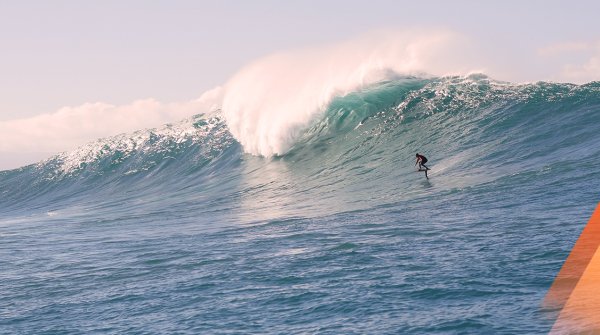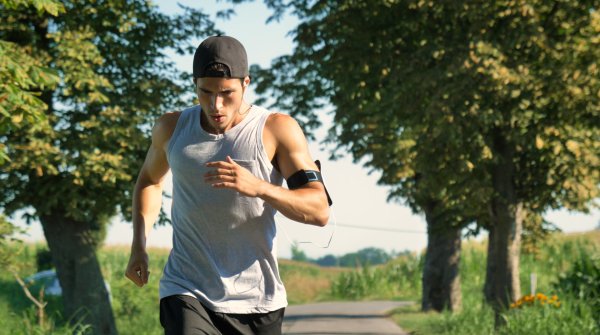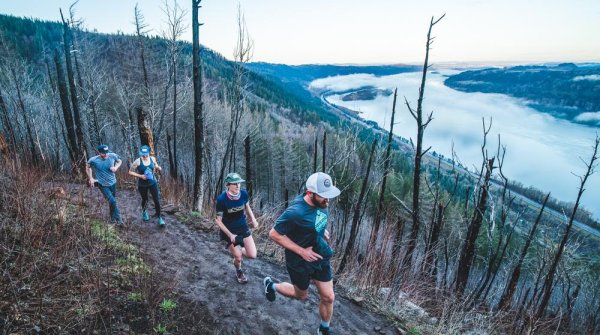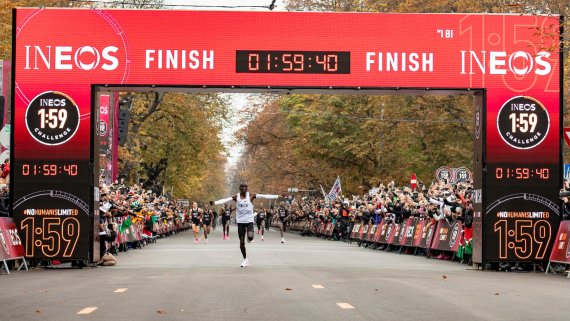
If a person was predestined to be the first to break the two-hour barrier, it was Eliud Kipchoge. The 34-year-old won gold in the marathon at the 2016 Olympic Games and currently holds both the official and unofficial world record.
As early as 2017, Kipchoge tried to break the mark under perfect conditions: At the Nike event "Breaking2" in Monza, Italy, he only missed it narrowly with 2:00:25 hours. His official world record is 2:01:39 hours at the Berlin Marathon 2018.
On 12 October, as soon as the perfect conditions were met, Kipchoge started his historical run at 8:15 a.m. The Kenyan was accompanied by a squad of constantly changing pacesetters. After every approximately four kilometres these 41 top runners - who won a total of 50 medals at the Olympics, World Championships and European Championships - were replaced.
The goal: Kipchoge had to run at a speed of more than 21 km/h continuously. An average time of 2:50 minutes per kilometer was the target, and Kipchoge and his teammates held the pace up like clockwork. An escort vehicle drove in front of the runners and shot a pace-setting laser beam onto the track.
Kipchoge ran - protected from the wind - in the midst of his pacemakers. Only for the last 300 meters he was alone on the track. With an unofficial running-in time of 1:59:40 hours, he beat the target by an incredible 20 seconds.
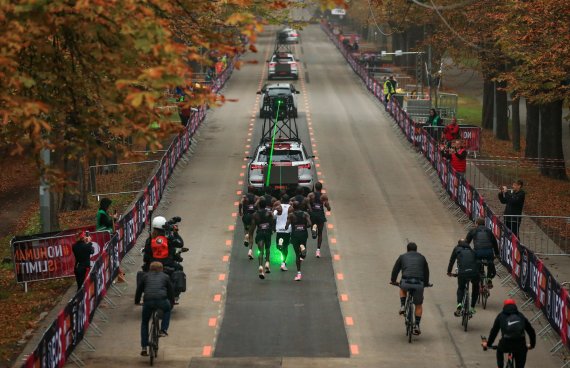
For Fran Millar, CEO of the Ineos team, Vienna was the perfect choice. The conditions in autumn Central Europe are perfect for the fastest possible race. Furthermore, the city is firmly anchored in the running community with its annual marathon race. "We wanted credibility, authenticity and the familiarity for people, who are marathon fans and watch marathons regularly to see something that is absolutely a part of their sports and that is what we feel Vienna offers us," Millar said.
In addition, the track was perfectly prepared for the Ineos event: The Prater Hauptallee, which Kipchoge ran up and down a total of 4.4 times, was newly asphalted. A specially built curve at the Lusthaus saved a total of 13 seconds. With a gradient of just 2.40 metres, the course was also ideal for the hunt for best times. The trees along the track shielded Kipchoge from the wind.
No. The framework conditions for Kipchoge were different from official marathons. He was not limited to fixed refill stations, but had access to drinks and food at any time.
An even bigger advantage were his pacemakers: While in normal races they keep up the pace from the start up to about 30 kilometers before quitting their race, Kipchoge got fresh pacemakers continuously from start to the last 500 meters.
For a long time, the British chemical company had very little to do with sport. This changed in 2017 with the purchase of the Swiss football club Lausanne-Sport. One year later the company entered the sailing sport and became the main sponsor of the Ineos Team UK, which targets to win the America's Cup 2021 with sailing icon Sir Ben Ainslie.
In May 2019, Ineos took over the successful Sky cycling team. The series winners in the Tour de France were also successful under the new name "Team Ineos": The Colombian Egan Bernal won the renowned Tour de France and earned the first title for Ineos.
The next step followed in summer, when Ineos bought the French first division football team OGC Nice. According to media reports, the company paid 100 million Euros for the club.
The Ineos 1:59 Challenge was not cheap for Ineos either: The first failed attempt two years ago cost Nike a total of 30 million Euros. The challenge now was to organise and pay for even more top-class pacemakers and an event in the centre of Vienna.
The German marathon runner Philipp Pflieger is sure that the event is still a success for the company. He told Spiegel before the race: "They use the sport for their own purposes; they hire many runners and experts to support Kipchoge, it costs a lot of money. But of course: If it works, then it's a great marketing stunt."
- Awards
- Mountain sports
- Bike
- Fitness
- Health
- ISPO Munich
- Running
- Brands
- Sustainability
- Olympia
- OutDoor
- Promotion
- Sports Business
- Textrends
- Triathlon
- Water sports
- Winter sports
- eSports
- SportsTech
- OutDoor by ISPO
- Heroes
- Transformation
- Sport Fashion
- Urban Culture
- Challenges of a CEO
- Trade fairs
- Sports
- Find the Balance
- Product reviews
- Newsletter Exclusive Area
- Magazine


